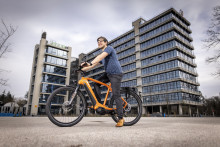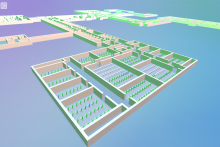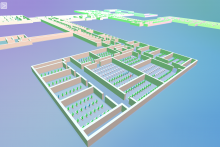Mario Boot is really excited about his research. ‘I have always loved cycling. My parents rode bikes more than they drove a car, and so it certainly runs in the family,’ he says. ‘I love being outdoors and I think field work is incredibly important. Going out of office was one of the first things I did when I started my PhD. I went to talk to technicians in bike shops, aiming to find out what the most common problems with e-bikes were. I went to Experience Centers where innovations are showcased and where people test new bicycles. I went to conferences and I connected with people on bike forums to get the first impression of how people felt about new developments for bikes. I want to understand people’s experiences, so that we can enhance them using digital technology.’
The PhD candidate is part of the Smart Connected Bicycles project, jointly run by the Transport Planning Group at the Faculty of Engineering Technology and the Pervasive Systems Group at the Faculty of Computer Science. ‘The project is quite special,’ says Boot. ‘Promoting cycling is very relevant for society. Universities, municipalities, and a global bicycle company work together on this.’
Main research question
Boot’s focus is on understanding how people experience emerging technology in the bike space. ‘There are a lot of gadgets and new technologies available for bikes. Just think of GPS trackers, lights with radar systems, helmets with lights, sensors measuring your activity, and so on,’ says Boot. ‘But the value is sometimes questionable. My main research question therefore is: how does all this change the biking experience? Do new technologies make cycling more comfortable, safer, convenient and/or efficient? And how can we measure that?’
Answering these questions will happen (largely) outside. This spring and summer, Boot is organizing field tests in the streets of Enschede. ‘In collaboration with the Enschede municipality, we want to test how new cycling technologies impact the cycling experience, especially regarding safety on specific road sections and intersections in the city,’ he says. ‘We will test new products and services available to cyclists and we will use various sensors to measure the participants’ experience.’
We are considering using this brain sensing headband. Brain data is quite complicated, but it has a lot of potential.
‘I borrowed this bike from our partner shop, because we will only use speed pedelecs and other e-bikes for the study,’ says Boot. The bright orange bicycle certainly looks impressive, but it is not quite the same vehicle that will be part of the field tests. ‘We want to equip bikes with a prototype of an intelligent speed adaptation system, which can suggest a safe speed to cyclists and thereby improve traffic safety. I’m really looking forward to that,’ the researcher says, as he starts unpacking some of the devices he plans to use for the study. He puts on a Fitbit-like bracelet and carefully takes out a thin black circlet from a box. ‘The goal is to collect physiological data. For example, we will wear this wrist band to measure stress levels and we are also considering using this brain sensing headband. Brain data is quite complicated, but it has a lot of potential.’
The scientist plans to work with one hundred participants. ‘Fifty elderly people, who generally use bikes for leisure, and fifty commuters who cycle for more practical reasons.’ The first testers, however, will be members of the research team – including Mario Boot himself. ‘Together we can build knowledge about how to make cycling more attractive than it is already.’







